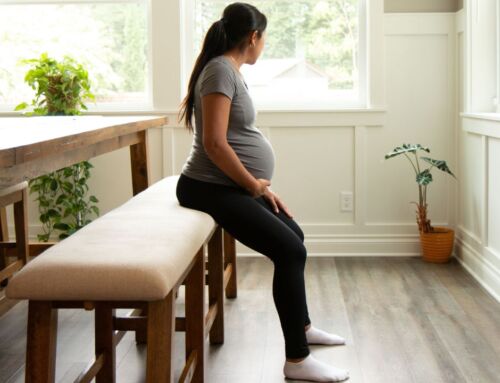For some women, a positive pregnancy test is a happy surprise, but if you’re reading this, your reaction is probably more along the lines of “OMG, what am I going to do?”
First, take a deep breath. It will be okay.
In Texas, you have two options for your unplanned pregnancy: parenting or adoption. Taking your time considering your options, especially if you aren’t sure you’re ready to be a mom, shows that you care about what’s best for your baby.
About “Keeping” Your Baby
A quick note about language first. When we discuss options, our adoption counselors do not use the term “keep the baby.” Instead, we say “parent your child.” There are two reasons why.
Much like the phrase “give your baby up for adoption,” the idea of “keeping your baby” implies ownership. Your baby is not a possession or a thing. It’s a human that will grow up to have his or her own life, opinions and emotions about the adoption.
“Keep the baby” also implies a single action. “Parenting” is a more accurate way to describe things. It’s the choice that you will make every day as you provide for your child’s emotional and physical needs until they are grown.
So for the rest of this post, we’ll say “parenting your baby” or “raising your child” in place of “keep your baby.”

Questions to Ask Yourself
Do I want to be a parent?
This is the first thing to consider, because this may be the only answer you need. If your answer is no, it’s time to begin exploring your alternatives.
Even if your first reaction is “Yes!” you may have concerns about the timing and your ability to provide for your child. That’s completely normal and many women feel this way. There isn’t always a “right” time to become a parent, and it’s likely that you will be able to find a way.
Can I provide a safe, stable home and meet this child’s physical needs?
Take a look at the baby section of any store, and it’s easy to get overwhelmed by how many things you can buy for an infant. Try to remember that many of these are for convenience, and you do not need them to be a good parent.
What you do need is a safe, stable home for your child. Your home needs to be free of violence, abuse and illegal drugs. Your home should also be free of environmental hazards that may pose a threat to your child.
You also need to be able to provide basic necessities, like diapers, clothing, somewhere to sleep, and child care. Breastfeeding can reduce the cost of feeding your child and, if you’re enrolled in pregnancy Medicaid or CHIP, you’re eligible for a free breast pump. Texas’ Safe Rider programs provides free car seats to women in their third trimester who are facing financial hardships.
Sometimes parents go through difficult periods and need some help. We understand, and we believe that no parent should be forced to make a permanent decision – like adoption – based on a temporary situation. There are many more organizations that can provide free or low-cost assistance to help you until you get to a better place, including food, housing, career advancement, and educational programs.
Can I provide for this child’s emotional needs?
Physical needs are only part of the equation when it comes to caring for a child. Raising them to feel loved, safe, connected, confident and accepted is critical to their mental health and overall well-being. In order to meet these emotional needs as a parent, you will need to be able to regulate your own emotions, set and keep boundaries, and love them unconditionally. You will need to be both physically and mentally available to your child by showing them attention and providing physical touch.
No parent is perfect, and all parents make mistakes. However, if ongoing issues such as drug addiction or untreated mental illness prevent you from consistently meeting your child’s emotional needs, adoption may be the safest choice for your child.
Am I considering adoption because someone else is telling me that I should?
You may also be considering adoption because of pressure from someone close to you. Is the baby’s father telling you to have an abortion or consider adoption because he does not want to be a parent? Is he issuing ultimatums that if you parent your child, he won’t be part of your lives? Unfortunately, this happens too often. Consider this: do you really want to place your child because someone issues threats and does not support you?
Parents and family members may also pressure you towards parenting or adoption, but remember that it is not their choice. You will be the one to carry this child, bond with him as he grows, and to give birth to him or her.
You have the right to make this choice free of pressure and coercion from anyone. Many women successfully raise children on their own without help from a partner or family by utilizing local services and building their own support networks.
What Are My Alternatives If I Don’t Think Parenting Is the Right Choice
If parenting doesn’t feel like the right choice, you do have options for giving your child a safe, loving home.
Let a family member raise your child
It could be an aunt, a cousin, your sibling’s family or even your own parents. This is called kinship adoption, and it has many benefits. Your child will grow up with biological relatives, have access to family medical history, and be inherently connected to their culture and heritage. You may even be able to have a closer relationship with your child. For some this is a blessing, but for others it can be a challenge. Figuring out boundaries and what your role in that child’s life needs to be discussed and decided on before placement.
Choose open adoption with an unrelated family
An adoption agency can help you find an adoptive family to raise your child. Adoptive parents go through background checks, interviews, home studies and more to ensure that they are capable of providing for your child.
With open adoption, you will be able to choose the adoptive parents and build a relationship with them. While this might seem confusing or overwhelming at first, research shows that open adoption benefits both you and your child.
Leave your baby at a safe haven
The State of Texas provides legal protection for parents to leave their child at designated safe haven location if they are unable to care for them. Once you have left your baby with emergency medical services personnel, custody will be transferred to the Texas Department of Family and Protective Services, and they will begin working to find a permanent home for your child through the foster care system.
Sometimes parents go through difficult periods and need some help. We understand, and we believe that no parent should be forced to make a permanent decision – like adoption – based on a temporary situation.
When You Need to Decide
How long you have until you need to make a decision depends on where you are in your pregnancy. It’s never too early or too late to reach out to an adoption agency — even if you found out you are pregnant, are near your due date, or have already delivered.
In Texas, you cannot sign relinquishment paperwork until at least 48 hours after the baby is born. Until that time, no decision is final and you are only making an adoption plan. If you feel like you need more time after the baby is born, Adoption Advocates may be able to provide temporary care (7-10 days) for your child while you process your emotions and make a decision.
Getting More Help with Your Decision
Whether or not to parent your child is completely up to you, but you don’t have to feel alone in making the decision. Consider talking to supportive friends or family about your situation. Sometimes just explaining things out loud can help bring clarity. Other times, they may be able to ask questions or provide suggestions to help you get a clearer picture.
If possible, we recommend discussing your options with the child’s biological father. In Texas, he does have rights as a parent once the baby is born. He may be supportive of co-parenting, or be willing to raise the child himself. If both want to move forward with adoption, having him on board and willing to sign the paperwork can make the process easier. He can participate in the open adoption too, with you or directly with the adoptive family if you are not on good terms.
Many professionals can provide a listening ear and help guide you through your decision-making process as well. Consider reaching out to a therapist, your pastor, school counselor or teacher.
If you want to learn more about adoption, Adoption Advocates counselors are available to explain the process and answer your questions – no pressure or judgment. You can also work with a counselor to create a parenting plan to help ensure you’ve considering every aspect of that option.
Always remember that this is your decision. While having conversations can be helpful, it’s not OK for anyone to pressure you, threaten you, or try to make you feel bad. You may find some people are not supportive of your choice – but they are not the ones who will have the responsibility of raising this child.
No matter what you decide, we want you to make the best choice for you and your child. If we can help, please reach out by calling (512) 477-1122 or texting an adoption professional directly at (512) 270-8415.








